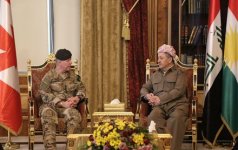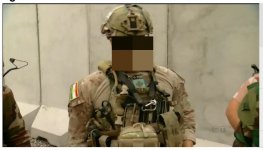Daesh is doomed, Canada's top general says during dramatic visit to Iraq
Gen. Jonathan Vance asks for Canadians to “put their shoulder behind” military forces in Iraq in an exclusive interview on the front lines with the Toronto Star and CTV News.
By: Bruce Campion-Smith Ottawa Bureau, Published on Thu Apr 28 2016
Gen. Jonathan Vance, chief of the defence staff, was in northern Iraq on Wednesday to visit the area where peshmerga soldiers, aided by Canadian forces, have been fighting Daesh.
ERBIL, IRAQ—Abandoned villages, a shattered bridge, hidden bombs and a steady stream of fighters headed to the front line.
That’s the scene that greeted Canada’s top general as he paid a dramatic visit to northern Iraq Thursday to the area where Canadian special operations forces soldiers are aiding peshmerga fighters in their battle against Daesh.
Gen. Jonathan Vance, the chief of defence staff, said Daesh (also known as ISIS and ISIL) is doomed to defeat and predicted that Canadian forces and their peshmerga allies will play a key role in the coming battle for Mosul, the Iraqi city that remains a key extremist stronghold.
“We are on key terrain with a key partner as what is being billed as the final coup de grâce of ISIL in Iraq occurs on Mosul,” Vance said.
The Toronto Star and CTV News had exclusive access as Vance came to take stock of Canada’s military mission, to “get eyes on as we contemplate next steps in the campaign.”
For more than a year, a small group of Canadian special operations forces soldiers have been working here, teaching peshmerga troops skills that range from the basics — map reading and shooting — to calling in airstrikes.
That mission will get bigger in the coming months with the Liberals’ decision to end airstrikes and instead triple the number of troops on the ground to act as advisers.
The United States has also committed Apache attack helicopters, more cash and more troops as western nations lay the groundwork for a final push to defeat Daesh, which has wreaked havoc across Iraq and Syria since 2014.
With the extra personnel, Canada will stretch its reach in this area west of Erbil, assisting peshmerga along a line more than 100 km long.
All of it is key terrain, some within sight of Mosul.
Vance predicts the battle for the Iraqi city will unfold over the coming year, a battle delayed as Iraqi forces first seek to oust Islamic extremists from other sites across the country.
“There’s no question that Iraq and the coalition, they all want to get on with it, but there’s other things that have to get done,” said Vance, who was making his first visit to Iraq since taking over as chief of defence staff in 2015.
“For a battle that must be started correctly and finished correctly, you don’t want to necessarily rush it,” Vance said.
But when that battle comes, Iraqi forces will squeeze Mosul from the south and it will be up to the peshmerga soldiers, mentored by Canadian special operations forces troops, to protect the northern flank — and block Daesh’s path of escape.
“At some point, the coalition and Iraqi security forces will deal with Mosul and our forces will be on vital ground, key to the containment of ISIL,” Vance said.
Vance stressed that the peshmerga — not Canadians — will be on the frontline to hold Daesh fighters in place. “We are responsible to train and support them. They’re responsible to hold,” Vance said.
Canadian forces and their peshmerga allies are already eroding Daesh’s capabilities in Mosul, thanks to their proximity to the city, which enables intelligence collection and targeting, said Col. Andrew Milburn, of the U.S. Marine Corps, who commands coalition special operations forces.
“It’s very careful targeting. Your guys are not causing civilian casualties here. I can affirm that,” Milburn told the Star in an interview earlier this week.
“That’s a hard claim to make, but these guys are doing this very well. They’re deliberately going after what we call key nodes in ISIS infrastructure, leadership, (command and control) nodes,” he said.
It was Vance’s first visit to Iraq since taking over as top general last summer and he saw firsthand the devastation caused by Daesh and the ongoing disruption caused by the conflict.
Vance visited a key stretch of the highway linking Erbil and Mosul where it crosses the Khazir River.
In 2014, this territory was all held by Daesh. With Erbil at risk, peshmerga forces counterattacked, pushing Daesh back. In their retreat, the militants blew up the bridge to stall the peshmerga counterattack.
Today, two spans of the bridge are nothing more than smashed concrete and twisted metal, resting in the river.
An improvised single-lane, steel-girder bridge has been erected in its place. On Thursday afternoon, a steady stream of cars carrying peshmerga fighters headed to and from the front, just a short distance to the west. Lacking military transport, they are forced to rely on their personal vehicles to move about.
Three villages, all within eyesight, have been largely abandoned and the buildings and terrain remain littered with explosive devices.
“Anything in the bushes, avoid it. The last thing I want is for you guys is to step on something that goes boom,” a Canadian special operations sergeant cautioned journalists as they awaited Vance’s arrival.
Indeed, the general’s visit — done under a tight cordon of security provided by Canadian special operations forces troops — was not without risk. Daesh militants are just a few kilometres away and their rockets and mortars land on the riverside villages every day, the sergeant said.
Vance cast an expert eye on the demolished bridge and said it highlights the capabilities of Daesh. “That’s a professional military act to drop that bridge,” he said.
But while still dangerous, Vance painted a picture of Daesh as a faltering force, starved of financing, losing terrain and forced to put inexperienced personnel into battle as “cannon fodder.”
“There’s no doubt in my mind — and I don’t want to overplay this — they will lose militarily in Iraq. It’s inevitable,” Vance said.
“But between now and the time they lose militarily they still have the power to generate big events that can cause a lot of problems.”
That’s why local commanders like Maj.-Gen. Aziz Waisi, commander of the Zeravani forces, express gratitude for the work of Canadian soldiers — and appeal for more.
“The Canadian people should be proud of their forces on the ground. They’re doing excellent work with us,” said Waisi, who accompanied Vance.
But like others here, he pressed home their need for better weapons to replace decades-old military gear, equipment like vehicles, anti-tank weapons, night-vision goggles, robots to help defuse improvised explosive devices, and drones.
“We are hoping that Canada can assist us more,” Waisi said.
As part of its retooled mission, Canada has committed to providing arms for a new Zeravani commando force. “As we form it and train it, they’ll have the weapons necessary to do the job,” Vance said.
But he quickly adds, “We are not doing a wholesale re-equipping of the peshmerga.”
Canadian commanders have conceded that more troops on the ground means more risk.
But Vance is hoping Canadians get behind the expanded mission.
“Just because it’s hard and dangerous doesn’t mean it’s bad,” Vance said.
“We do danger. That’s what a military force is for. Canada’s military goes to dangerous places all the time. It’s always for a good cause. I’d like very much for Canadians to put their shoulder behind what we’re doing here,” Vance said.
“Despite the dangers, it is for a good cause.”
---------------------------------------------------
BZ to Mrs Laflamme for having the 'nads to get some sand on her boots.





